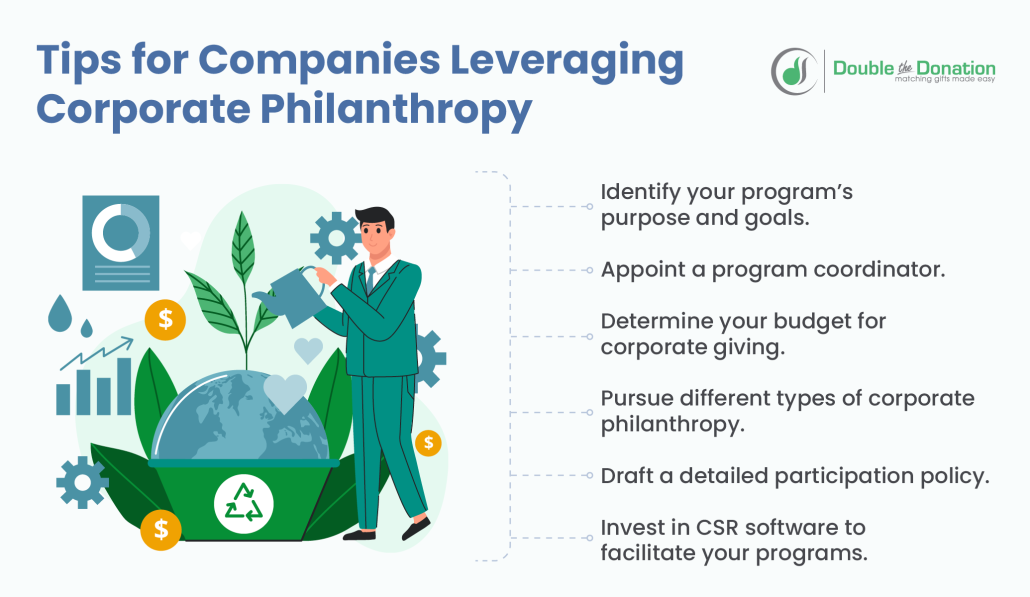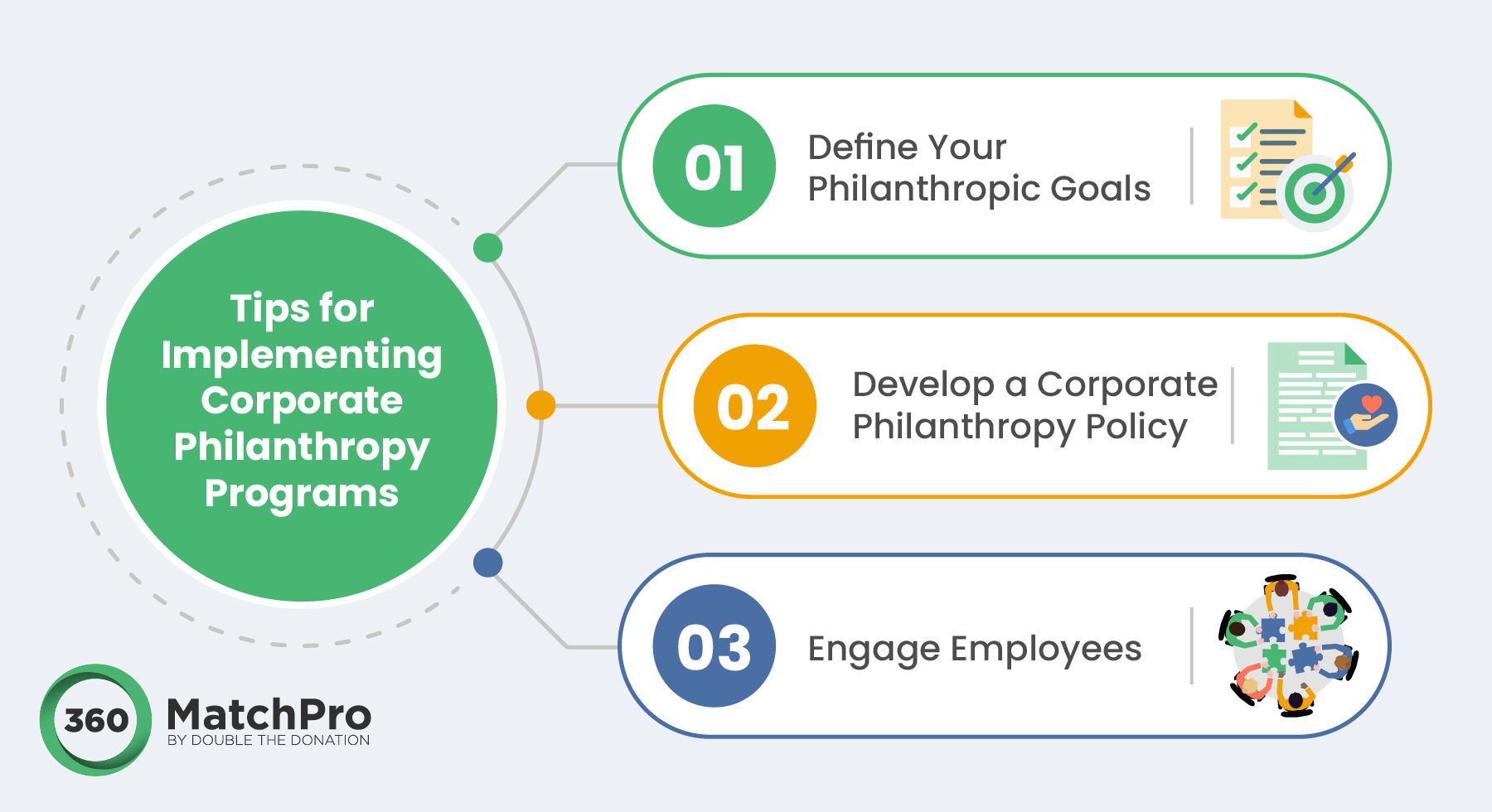10 unexpected ways corporate philanthropy transforms communities
The Role of Corporate Philanthropy in Fostering Sustainable Business Practices
Corporate philanthropy has arised as a pivotal strategy for businesses aiming to incorporate sustainability right into their operations. By straightening corporate objectives with environmental and social efforts, companies can promote much healthier ecosystems. This technique not only improves company credibility but also strengthens stakeholder partnerships. The real level of its impact on lasting service success stays to be checked out. What innovative techniques are being taken on because of this?
Comprehending Company Philanthropy and Its Value
Business philanthropy works as a crucial system where organizations can contribute to societal health while improving their own credibilities. This method includes organizations assigning resources, such as funds, time, or competence, to support neighborhood initiatives, charitable reasons, or social programs. By engaging in humanitarian efforts, companies can address pressing social issues, such as education and learning, health and wellness care, and ecological worries, thereby playing a critical duty in cultivating positive modification.
In addition, company philanthropy can improve employee spirits and draw in skill, as people increasingly seek to benefit socially liable companies. It can likewise reinforce client commitment, as consumers like brands that demonstrate a commitment to making a difference. Ultimately, comprehending the significance of business philanthropy depends on identifying its double advantages: enriching community welfare while all at once enhancing service integrity and credibility in the eyes of stakeholders. This placement of social obligation with industrial interests underscores its value in today's corporate landscape.
The Connection Between Corporate Philanthropy and Sustainability
While lots of firms engage in philanthropy to enhance their public picture, a deeper connection exists between business philanthropy and sustainability. Company philanthropy frequently straightens with sustainable methods by sustaining efforts that attend to social and environmental obstacles. They add to a healthier ecosystem and culture when businesses spend in community tasks, sustainable power, or educational programs. This dedication not only fosters goodwill yet additionally strengthens stakeholder connections, boosting brand loyalty.

Situation Studies: Effective Corporate Philanthropy Initiatives
Numerous companies have effectively integrated humanitarian campaigns into their service approaches, demonstrating the concrete advantages of such dedications. For example, Microsoft has introduced countless programs, such as its AI for Earth campaign, which supports ecological sustainability through modern technology. This strategy not only aids conservation efforts yet likewise improves Microsoft's online reputation as a leader in company duty.
Unilever's Sustainable Living Plan highlights environmental and social effect, aligning its philanthropy with service goals. By moneying jobs that improve health and sanitation, Unilever enhances its brand name while adding to worldwide wellness.
Another noteworthy example is Patagonia, which vows 1% of sales to ecological causes. This commitment resonates with customers, fostering commitment and driving sales.
These study highlight that effective business philanthropy can yield financial returns while promoting sustainable techniques, enhancing the concept that ethical company techniques are useful for both society and base lines.
Building Stronger Stakeholder Relationships Through Philanthropy
Philanthropy acts as a necessary tool for companies seeking to reinforce their relationships with stakeholders, as it fosters count on and demonstrates a commitment to social responsibility. By engaging in charitable campaigns, services can link with neighborhood communities, enhancing their track record and motivating stakeholder commitment. This interaction commonly brings about significant interactions, producing a feeling of shared values in between the firm and its stakeholders.
Additionally, kind efforts can deal with details neighborhood demands, enabling organizations to contribute favorably to social obstacles. This involvement not only showcases a business's honest position however additionally aids in attracting and preserving consumers who prioritize social duty.
Additionally, workers often feel more inspired and involved when they see their company proactively getting involved in philanthropic activities, leading to an extra effective office culture. Corporate philanthropy comes to be a tactical opportunity for developing stronger, much more resistant connections with diverse stakeholder teams.
Measuring the Impact of Business Philanthropy on Service Success
The link in between corporate philanthropy and stakeholder interaction sets the phase for examining its influence on general business success. Organizations frequently determine this influence with numerous metrics, consisting of brand online reputation, staff member fulfillment, and consumer commitment. Philanthropic initiatives can enhance a company's photo, promoting trust among consumers and investors alike. Involved staff members have a tendency to exhibit higher morale and productivity, straight associating to enhanced company efficiency.
Quantitative analysis can additionally site link be utilized, with companies reviewing financial returns versus kind expenses. Research study indicates that companies with strong humanitarian dedications commonly experience greater supply linked here performance and decreased volatility. In addition, qualitative assessments, such as stakeholder responses, can supply insights into neighborhood perceptions and lasting relational benefits.
Ultimately, gauging the influence of company philanthropy needs a complex method, incorporating both qualitative and measurable information to ensure a complete understanding of its influence on company success. corporate philanthropy.
Regularly Asked Inquiries
Just How Can Small Companies Participate In Business Philanthropy Efficiently?

What Prevail False Impressions Regarding Business Philanthropy?

How Does Company Philanthropy Impact Worker Spirits?
Corporate philanthropy favorably influences employee spirits by fostering a sense of function, enhancing task complete satisfaction, and promoting loyalty. Workers frequently feel more involved and inspired when their firm adds to social reasons, developing a supportive workplace.
What Are the Tax Obligation Benefits of Corporate Philanthropy for Organizations?
Corporate philanthropy provides considerable tax obligation benefits for organizations, including deductions on philanthropic contributions and possible reductions in taxable revenue. These rewards motivate companies to take part in social initiatives while concurrently improving their monetary standing.
Just How Can Business Select Reliable Philanthropic Allies?
Business can pick reliable kind companions by reviewing additional hints positioning with their values, assessing impact capacity, taking a look at monetary openness, and cultivating strong interaction. This strategic approach improves cooperation and guarantees shared advantages for both parties entailed.
Corporate philanthropy serves as a crucial device via which services can contribute to societal health while boosting their very own track records - corporate philanthropy. Inevitably, comprehending the importance of business philanthropy lies in recognizing its twin benefits: enriching area welfare while at the same time boosting company reputation and reliability in the eyes of stakeholders. While many companies involve in philanthropy to enhance their public image, a deeper link exists between corporate philanthropy and sustainability. The connection between company philanthropy and stakeholder interaction establishes the phase for evaluating its effect on general organization success. Business philanthropy provides significant tax obligation advantages for organizations, consisting of deductions on philanthropic contributions and possible decreases in taxed revenue